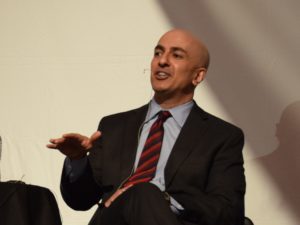
The Midwestern economy is strong but not without challenges, and inflation has not been as transitory as he initially projected, said Neel Kashkari, president of the Federal Reserve Bank of Minneapolis.
Kashkari and David Kohl, Virginia Tech professor emeritus of agriculture and applied economics, discussed the region’s short- and long-term challenges and trends Tuesday during a 90-minute virtual event hosted by bankers’ associations in Wisconsin, Illinois, Michigan, Minnesota, Montana and South Dakota.
Kashkari stressed that the economy was in prolonged expansion before the pandemic struck in early 2020. The resulting government shutdown mandates, coupled with consumers’ reluctance to travel, temporarily stifled that expansion. Since then, economic growth has resumed but remains uneven: Even though GDP has bounced back, the United States is still experiencing a shortfall of 4 to 6 million workers as former employees wait to come back until they find a more attractive job. In turn, this is causing gaps in demanding industries, such as long-haul trucking, health care and child care.
Though economic conditions across the Midwest mirror trends across the country, Kashkari noted there are still state-by-state differences: Wisconsin initially recovered quicker from Covid-19 than Minnesota, but that state’s pace has been slower over the past 12 months. Wisconsin has also been less impacted by last year’s drought than other states. Still, regional manufacturing, real estate, ag and construction sectors are in good shape.
Inflation, which is at its highest level in decades, remains a top concern across the economy. Kashkari still believes high inflation is transitory and will subside once the pandemic ends. Still, he acknowledged that inflation — brought on by large stimulus infusions, increased demand for goods, supply chain disruptions and a tight labor market — is higher and is lasting longer than he expected. Kashkari expects demand will normalize before the supply chain does. Sustained long-term inflation expectations could lead to reduced customer sentiments, which Kashkari said could result in a self-fulfilling prophecy of an economic downturn.
Kashkari, one of the more dovish Fed policymakers, said in a recent essay that he supports two interest-rate hikes in 2022. That is an increase from his position in September, when he projected zero, but below the three announced in December by the Federal Open Markets Committee.
Kohl said there are a number of global trends that are disrupting the economy and will likely lead to long-term changes, some of which include:
- Environmental, social and governance: Kohl expects banks will be benchmarked on this, as more activist investors enter the market.
- Oil and energy: As more companies disinvest from fossil fuels, higher fuel and energy prices are being incurred, he said.
- Climate change: Kohl said bankers must consider the possibility of climate change-induced extreme weather events in critical parts of the United States.
